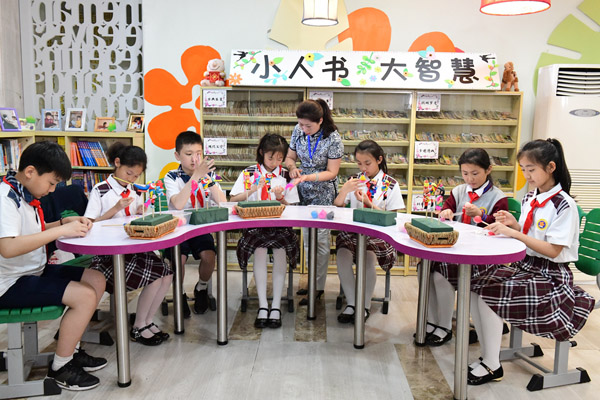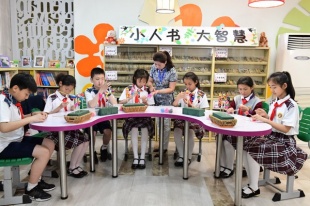These left-behinds are in no way left behind


At first blush you may suspect that Anjing Primary School, on the outskirts of Guiyang, in Guizhou province, would struggle to match it with its peers in regard to academic performance. After all, 40 percent of its 1,573 students are children of migrant workers and rural villagers - the kinds of children who may fail to shine academically because of the extra pressures they face socially.
However, the students of Anjing School are an equal to their city peers with their academic levels and admission rates to higher education institutions, a reflection of the school's efforts to raise teachers' professional capacities, and the improvement in the school's facilities in recent years.
In the junior high school entrance exam last May, 98 percent of student grades were above the national average level from the Anjing School. The number was 56 percent seven years ago.
To upgrade teachers' professional skills, the school has developed multiple activities, including competitions, monthly discussions on lessons as well as evaluating teachers' classes in a certain time frame, largely improving teaching abilities, the school says.
"Teacher performance and how students have learned are monitored to evaluate how efficient the teaching is," says Wang Na, the principal.
Since the evaluations were introduced in 2011, students have performed better academically, she says, and Anjing Primary school has ranked No 1 among rural schools in the province at the same level in terms of entrance exams to middle schools last year.
Students from rural and migrant worker families - most on lower incomes and with fewer job hours - often have lower marks, and the school has developed multiple activities to involve more students in the daily school life to boost their confidence.
The school has 37 student clubs, and each student is required to do at least one hour's study in the Youth Hall, the activities of which include dancing, wax printing and clay sculpting.
When the students took part in a recitation competition in the city in 2014 for the first time they were nervous and afraid to talk to strangers, Wang says. Zhang Aiqi, 12, a sixth grade student at Anjing School, who was then head of the recitation team, says she was extremely shy and did not know where to put her hands.
By taking part in many different activities under the guidance of teachers the school's students appear to have become much more self-confident.
"Our chorus team joined in the Ninth Chinese Children Chorus Festival this year," says Liu Jie, the school's director of teaching.
"Their performance was wonderful and gained widespread attention from various media."
Upgrading the school's facilities has helped raise participation levels and the quality of instruction. The school, at which grades one to six are taught, has been relocated twice in the past 40 years, which has no doubt contributed greatly to those improvements.
Li Daju, 44, who has taught at the school for 20 years and who was a student there in the mid 1980s, says the former Anjing School was remotely located, making it difficult to get to for students and to attract teachers. Because of a dearth of teachers, Li was forced to teach both mathematics and Chinese.
With the help of the city government, things improved greatly in 2012, the school being relocated to its current site, and its roll of 1,573 in the year just gone compared with just 100 eight years ago. The school's amenities include three five-storey buildings and a playground with a 300-meter track, and the school has been transformed over the past few years, the principal Wang says.
"Our students generally lacked confidence because their families are not well-off. I hope our school can help them find confidence and become helpful and optimistic children who not only get good marks but can contribute to society as well."
Li Hanyi and Zhao Yandi contributed to the story.





































